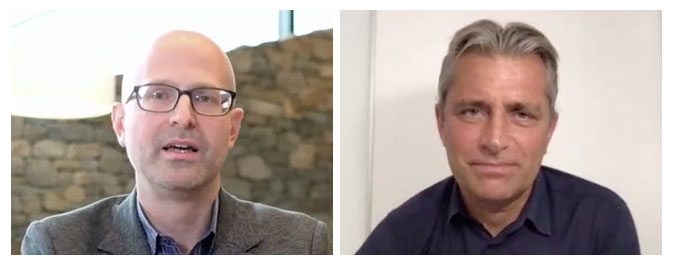TORONTO — Becoming CEO of a company during a worldwide pandemic would seem like a daunting task for most people. But Peter Kern, who took over the reins at Expedia Group this past April, just a few weeks after the onset of COVID-19, saw his new role as a blessing in disguise.
“When you have fresh eyes and have a crisis like this, it gives you the latitude to make decisions that were hard to make before,” said Kern during yesterday’s opening General Session of explore ’20, Expedia’s annual travel industry conference, which this year took on a virtual format due to the pandemic. “In a weird way, COVID is a blessing if you want to be a change agent. Obviously, it’s terrible for humanity but in terms of really focusing your company, it gives you an opportunity to focus on what really matters, and that’s a hard thing to do when it’s just business as usual.”
For Kern, what really matters is simplifying the way Expedia does just about everything, from technology to branding. This simplified approach to doing business was top of mind even before the pandemic, he said.
“Expedia was a company built to some extent on a lot of acquisitions and brands. I think we ran that play as far as it could go and we were thinking it was time to get a little more refined,” he said. “The best tech companies in the world tend to do a few things very well, not 1,000. We’ve been doing that work and it’s a big change for us. I encourage everybody out there to take this moment to do it too.”
When asked what three things he hopes to do very well, Kern thought long and hard.
“I want to really understand the power of the customer, I want to really drive success for our suppliers with everything we have to offer, and I want the best travel technology platform in the world – period.”
Though Day One of the conference focused largely on online booking statistics across several sectors like Air, Cruise and Lodging, it did also highlight new travel trends and business development tips that any viewer, including travel agents, would find helpful, particularly during this challenging time.
Here are some highlights:
RECOVERY
Everyone wants to know when travel will return to pre-COVID numbers, including Expedia which saw a massive 82% decline in revenues in Q2. But although the company is unable to pinpoint when exactly recovery will occur on a mass scale, Eric Hart, Chief Financial Officer, Expedia Group, is optimistic that Expedia has already gotten “to the other side,” with week-on-week searches up year-on-year for trips in January and February 2021.
“The recovery is going to be mixed and it’s going to change over time. It will be mini stories and on a geography by geography basis, maybe one country to the next versus more broadly speaking,” he said. “We do not know when each of these markets will open up or when individuals will feel comfortable to travel but – spoiler alert – travel will come back.”
Hart did note, however, that air has not recovered at the same rate as hotels and alternative accommodations, remaining significantly down year-over-year. “There is some recovery, which is great to see, but I suspect we’ll have some volatility over time and it will be on a geography basis.”
With news of a vaccine already being rolled out in the United Kingdom and in Canada as early as next week, not to mention rapid testing trial programs at airports like Calgary International Airport, air travel is poised to show signs of recovery in the first half of 2021. However, Cyril Ranque, President, Travel Partners Group at Expedia Group warns that the travel industry cannot afford to wait for the vaccine.
“I think the vaccine will obviously help but let’s be clear, there’s got to be a way to travel before everybody gets vaccinated, otherwise it’s going to take us another year,” he said. “At the systemic level, it’s about ending quarantines with travel protocols between countries and implementing corridors. I see some corridors being implemented now, which is positive.”
Ranque also noted that travel’s recovery isn’t just dependent on airlines but rather on all links in the supply chain.
“The travel ecosystem needs all lines of business,” he said. “We need flights because obviously that’s the first part to allow people to reach their destination. But we also need diversity of hotels, which is why we launched a US$275 million recovery plan for our small hotel partners around the world. We also need activity partners to survive and be healthy, we need car rental companies. And we also need restaurants because if they’re not open people won’t want to travel. It’s really important that the whole ecosystem is maintained and that there are policies to support that.”

l-r: Eric Hart, Chief Financial Officer, Expedia Group & Cyril Ranque, President, Travel Partners Group at Expedia Group
BOOKING WINDOWS
With so much uncertainty in travel right now and travel restrictions and border closures changing so frequently, it’s not surprising to see consumers waiting to book their trips until the very last minute, said Hart.
“With Hotwire, for instance, which is known for last-minute travel, they’ve actually seen their last-minute bookings increase even more and, interestingly, increase for trips that are within 50 miles,” he said. “Our overall lodging business is seeing the same thing, we’re getting two times the number of same-day lodging share that we typically see.”
But these last-minute bookers are being balanced out by those dreaming and booking long-term, creating a “barbell” effect.
“People are searching, they’re looking for that dream vacation and they’re aspiring to get out and explore the world,” said Hart. “People in France are searching Dubai, people in the U.S. are looking at Mexico and the Maldives, and people in Italy are increasingly looking at New York City. We don’t quite know when people are going to start booking some of these more aspirational trips but they’re certainly looking.”
Referencing cruise travellers specifically, Hart is encouraged following Expedia’s highly successful September promotion that saw nearly 9,000 passengers book a cruise for 2021 and 2022.
CLEANLINESS & FLEXIBILITY
Hart broke down the various factors that are leading consumers to search for and book future travel. He cited a recent Travelocity survey in which two out of three customers described flexible cancellations and cleanliness as “critically important,” and that the vast majority of respondent ranked these as the top factors that are driving their decision making.
This is proving to be true on Expedia’s site, with flexibility and cleanliness winning out among all product offerings.
“In vacation rentals, we’ve seen a real share shift to the properties that have updated hygiene, flexibility and cleanliness information, with the properties that have updated getting more bookings than those that have not,” said Hart. “On the air side, we’re seeing the same thing. We’re seeing airlines put in place more flexibility, eliminating fees and really focusing on the science behind cleaning a plane. And then they’re publishing and putting upfront that information so customers can feel comfortable in booking.”
WORKING HOLIDAYS
“We’re also seeing a real combination of living and working,” added Hart, who reported an increase in families renting accommodations for an extended period of time.
“If the kids are going to school virtual and I’m going to work virtually, why not do it at a new place that’s beautiful? We’re seeing a lot of people do that,” he said.
To highlight how companies have adapted and shifted their messaging in response to the pandemic, Hart recounted receiving an email recently from the Surf Camp he attended a few years back.
“They used to focus on escaping the everyday and getting away from technology to come surf,” said Hart, “but now they’re telling customers that they have a great working environment with great connectivity so that they can continue to work while on a surfing holiday. It’s a real trend that we’re seeing.”
BIG OPEN SPACES
After months of lockdown and social distancing measures still in place around the world, Expedia is reporting a spike in destinations where people can be outdoors and naturally distanced from others. Case in point: Yellowstone National Park and its surrounding area, which Hart said is one of Expedia’s fastest growing destinations.
“Using this as an example, people can go and stay in a vacation rental or a hotel, they can be outside with their family, experience the world and see beautiful things and naturally be social distanced,” said Hart.
Expedia Group’s explore ’20 concludes today, Dec. 10, with insight into brand strategies, partnerships and technology in the ‘new normal.’ For more information go to ExploreExpediaGroup.com.

